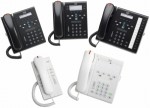Cisco Systems unveils new VoIP phones
Earlier this month networking and enterprise VoIP giant Cisco Systems announced a brand new series of VoIP phones – the 6900 series.
First you’ve heard? Don’t feel bad.
The 6900 series seemed to have been launched with out a powerful marketing push. After diving in deeper, I found out why.
The new 6900 series of VoIP phones from Cisco are an interesting move for the company as they seem to buck a number of trends. Not just for Cisco, but the VoIP industry in general.
Upon first sight you’ll notice something different about these new VoIP phones. They’re ugly. Gone is the slick styling that businesses of all sizes have grown to crave, replaced by a rather basic and drab aesthetic.
Next, the phones support SCCP, Cisco’s proprietary VoIP protocol. That’s right. They’re not SIP and there is no SIP support. Sorry all of you open source and open source based fans.
Lastly, the 6900 series is reportedly a response to the need for a more “economical” solution. But at a reported cost of between $250 and $750 per phone, that statement is a stretch.
(There’s also no G.722 wideband codec support)
Now the 6900 series isn’t all bad news.
The new series are more energy efficient thanks to a Deep-Sleep mode which allows the phones to consume 50% less power during off hours. In addition to increased energy efficiency, the phones can also be had in white or black.
Neither of these, however, are really that exciting.
Given the design aesthetic, lack of SIP support and overall price points one has to think these will be a tough sell – even with the Cisco name on it.

9 Comments
One more reason to stick with Aastra and Polycomm. If it has to be Cisco, the venerable 7940G is still leagues ahead of the pictures above. Interesting move regardless.
Thanks for sharing this story with us Garrett
WOW! Cisco makes a phone that rivals the Grandstream line in fugliness..
At least those Grandstream phones have a price which matches the “it’s the simplest SIP phone which works and we could not afford a designer”.
I do hope the shielding is better on those Cisco phones: I recently powered a Grandstream bt-100 up near a working radio scanner and suddenly there was interference on at least half of my programmed channels. That’s what you get for 39 euro…
Nice write up, Garrett.
I think I found a minor google bomb: search for “why sccp” (no quotes) and get the suggestion “why sip”. Plus a couple 4 year old articles predicting SIP winning out over SCCP!
But I suppose Cisco is big enough to launch a niche phone that’s designed for customers already using their CallManager.
I can’t see it appealing to anyone else – why would I upgrade my phones to a proprietary protocol when there are so many great SIP phones out in the market?
Sam
@ Mike
I heard they designed these during the mandatory two weeks off at the end of last year 😉
@ Sam
I think the only reason SCCP is around and people still use it is because “It’s Cisco.”
It never ceases to amaze me that companies continue to try to compete against the Internet’s ability to quickly and effectively distribute open source initiatives. Rather than embrace it, they seem to try everything to built walled gardens and retain their existing business models. Learn to embrace & profit from open source in different ways.
The real issue is “features” that end-users expect on their phones in “real businesses”. No body wants to buy a phone just because it has “SIP” in it (except the techie guys). People/businesses want ip phones for features. And they are not interested in loosing feeatures they have been using for decades on traditional desktop phones.
Sadly – SIP is still in 2009 – not able to deliver the features that proprietary protocols can. Or – we can all go back to MGCP – which can provide a whole lot more features easily.
Bottom line:
1. If you want basic features only (like the good old SLT / Black phones / Residential phones) – stick with SIP (and it works well for the carriers).
2. If you want traditional desktop phone features for business phones – you are better of using MGCP, SCCP, or a proprietary protocol.
Cheers!
@ “VoIP Guru”
Ah, what “features” are businesses demanding which SIP based IP phones are not delivering? I certainly have not heard many, if any, businesses complain about SIP phones lacking features.